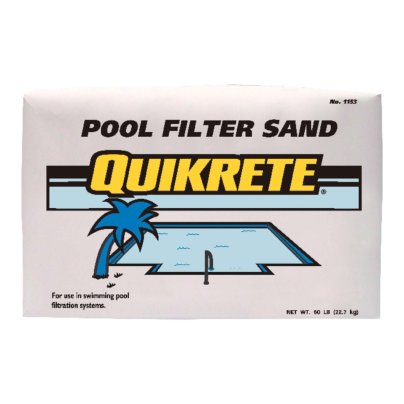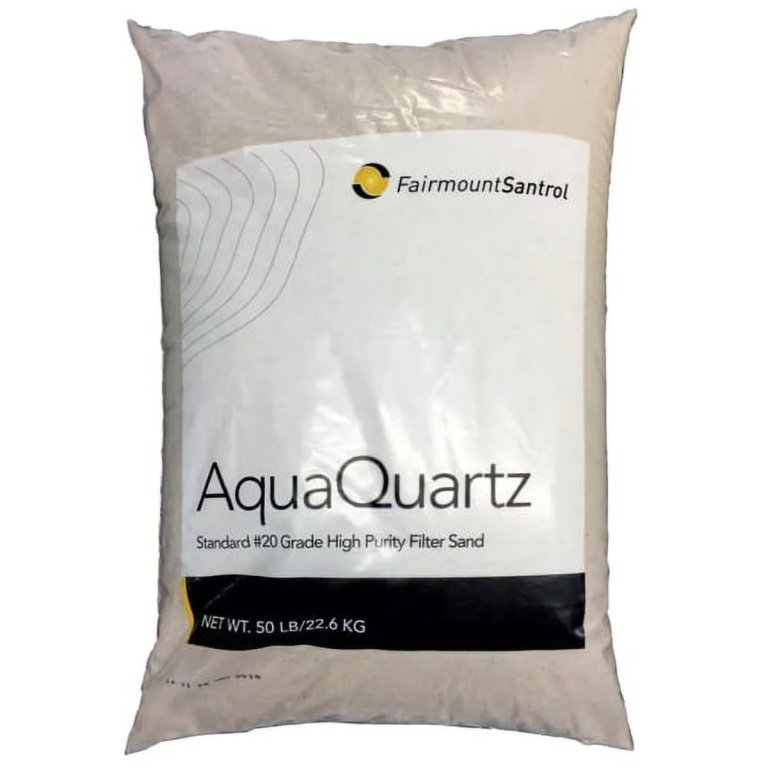
We may earn revenue from the products available on this page and participate in affiliate programs. Learn More ›
Sand filters are commonly used for keeping your swimming pool’s water clean, but over time the pool filter sand can become dirty and contaminated, which affects how well the filter can function. For example, pool filter sand can commonly filter debris as small as 20 microns, with 1 micron equal to 1/26,000 of an inch.
The best pool filter sand may be able to filter particles as small as 3 microns, though it depends on the type of pool filter sand that’s used. Our favorite is the FairmountSantrol AquaQuartz thanks to its natural formula and easy backwashing. The list below features some of the best pool filter sands that we tested and/or thoroughly researched and the most important factors to consider before deciding on one type of sand over another.
- BEST OVERALL: FairmountSantrol AquaQuartz Silica Pool Filter Sand
- RUNNER-UP: Quikrete Pool Filter Sand
- BEST BANG FOR THE BUCK: Palmetto Vermiculite Pool Filter Sand
- BEST SILICA SAND: HTH Pool Care Pool Filter Sand
- BEST ZEOLITE SAND: Zeo, Inc Natural ZeoSand ZeoLite Filter Media
- BEST GLASS SAND: Harsco Metals & Minerals Filter Glass

Product Comparison
| Type | Pool water type(s) | Quantity | |
| FairmountSantrol AquaQuartz Silica Pool Filter Sand | Silica | Chlorine and saltwater | 50 pounds |
| Quikrete Pool Filter Sand | Silica | Unlisted | 50 pounds |
| Palmetto Vermiculite Pool Filter Sand | Silica | Unlisted | 50 pounds |
| HTH Pool Care Pool Filter Sand | Silica | Chlorine and saltwater | 50 pounds |
| Zeo, Inc Natural ZeoSand ZeoLite Filter Media | Zeolite sand | Unlisted | 50 pounds |
| Harsco Metals & Minerals Filter Glass | Glass sand | Unlisted | 40 pounds |
Our Top Picks
The following products were chosen, researched, and/or tested using several criteria, including sand type, grain size, and overall quality, factoring in the additional shopping considerations listed below. Keep reading to discover the best pool filter sand for your swimming pool.
Best Overall
FairmountSantrol AquaQuartz Silica Pool Filter
What We Like
- 100 percent natural and chemical-free sand
- Backwashes easily and evenly
- Comes in multiple quantities
- Odorless formula
What We Don’t Like
- Some users report poor-quality filtration and packaging
- No grain size is listed on the product label
Product Specs
- Type: Silica
- Pool water type(s): Chlorine and saltwater
- Quantity: 50 pounds
Silica pool filter sand, like this FairmountSantrol product, is an affordable replacement medium for all sand filters. The 20-grade silica sand is capable of filtering a wide variety of pool debris like dirt, oil, hair, algae, and more. It’s 100 percent natural silica sand that has been mined instead of manufactured so that users don’t need to worry about chemicals in the sand.
The silica pool filter sand comes in a 50-pound bag, though it’s also sold in a four-pack if more sand is necessary. It doesn’t solidify or form clumps, reducing the chance of filter clogging or channeling. The sand is also odorless and it backwashes easily, helping to keep the pool clean and crystal clear.
Get the FairmountSantrol pool filter sand at Walmart or Amazon.
Runner-up
Quikrete Pool Filter Sand
What We Like
- Properly graded and clean sand
- Affordable price point
- Lasts for 3 to 5 years
What We Don’t Like
- Packaging may be fragile
Product Specs
- Type: Silica
- Pool water type(s): Unlisted
- Quantity: 50 pounds
Silica is one of the most reliable pool filter sand types on the market, and this option from Quikrete is a favorite among pool owners. This properly graded and clean sand has a 20/40 ratio that is designed to capture fine debris and dirt in pool water, improving both the overall clarity and purity. Plus, it lasts for 3 to 5 years before needing replacement sand.
The brand also includes over 50 pounds of sand at an affordable price point, which makes this an ideal option for those with larger pools and filters. The only downside to this filter sand for pools is that the packaging may not be as durable as some other options on the market and should be transported and stored carefully.
Get the Quikrete pool filter sand at Ace Hardware, Amazon, or The Home Depot.
Best Bang For The Buck
Palmetto Vermiculite Pool Filter Sand
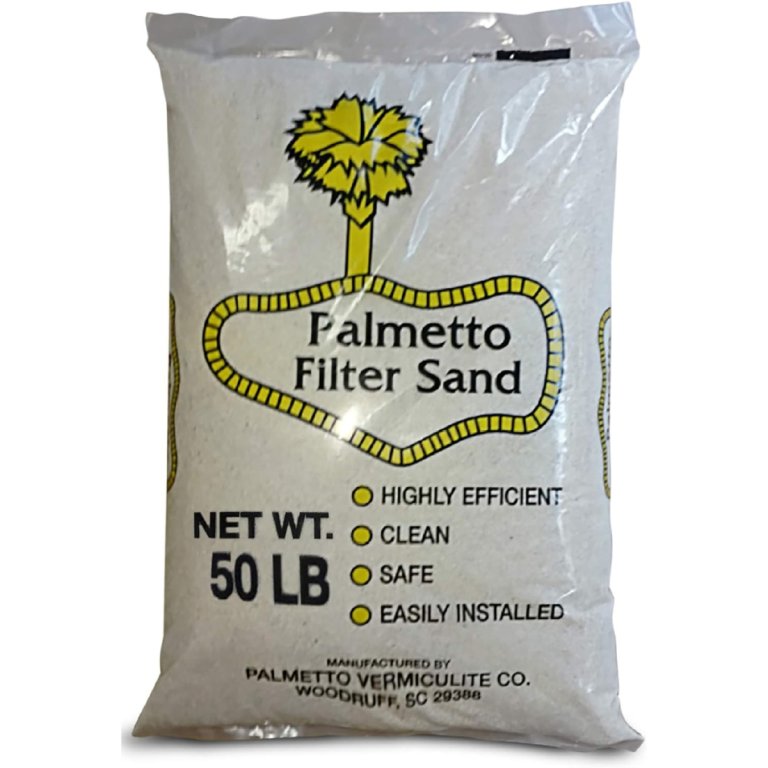
What We Like
- 100 percent natural product
- Washed formula ensures no impurities
- Odorless and nonclumping
- Lasts for 3 to 5 years
What We Don’t Like
- No grain size or compatible pool type listed
Product Specs
- Type: Silica
- Pool water type(s): Unlisted
- Quantity: 50 pounds
Affordability is important when it comes to pool maintenance because pool chemicals, cleaners, and repairs can be costly. So whenever possible, it’s a good idea to look for inexpensive products like this Palmetto pool filter sand. The silica sand comes in a large 50-pound bag and is 100 percent natural with no chemical additives to worry about. It’s also washed thoroughly before packaging to ensure all impurities are removed.
The 20-grade formula is easy to backwash and can be used to filter leaves, dust, dirt, oils, algae, insects, and any other particles that are larger than 20 microns. It’s an odorless, non-clumping product that won’t clog the filter, and it lasts between 3 and 5 years before needing to be replaced.
Get the Palmetto pool filter sand at Amazon.
Best Silica Sand
HTH Pool Care Pool Filter Sand

What We Like
- Reliable 20-grade formula
- Lasts for 3 years
- Nonclumping formula
What We Don’t Like
- Weekly backwashing is recommended
- Pricey compared to other options
Product Specs
- Type: Silica
- Pool water type(s): Chlorine and saltwater
- Quantity: 50 pounds
Keep the water clean and clear with this HTH silica pool filter sand that is designed to trap dirt, dust, leaves, oils, and other small particles down to 20 microns in size. The 20-grade silica sand can be used with a variety of different sand filters including residential, commercial, above-ground, and in-ground filters, though the amount of sand per filter will differ based on the specific filters.
The pool filter sand comes in a 50-pound bag, and won’t form clumps or cause clogging. Just replace the existing sand and backwash the system until the water is running clear. After connecting the filter, the sand will remove debris from the pool water and won’t need to be replaced for 3 years (1.5 years for pools used year-round), though weekly backwashing is suggested for peak clarity.
What our tester says: Stephanie Cronk, executive editor of product reviews at Bob Vila, notes that “this sand is quality sand at an affordable price. It takes four bags to fill my sand filter and lasts multiple seasons. For reference, I have a 24-foot above-ground pool. We change our sand every three seasons, but we could easily extend another season or two using this sand. Our pool is always clean and clear when using this HTH pool filter sand.”
Get the HTH pool filter sand at Ace Hardware, The Home Depot, or Walmart.
Best Zeolite Sand
Zeo, Inc Natural ZeoSand ZeoLite Filter Media
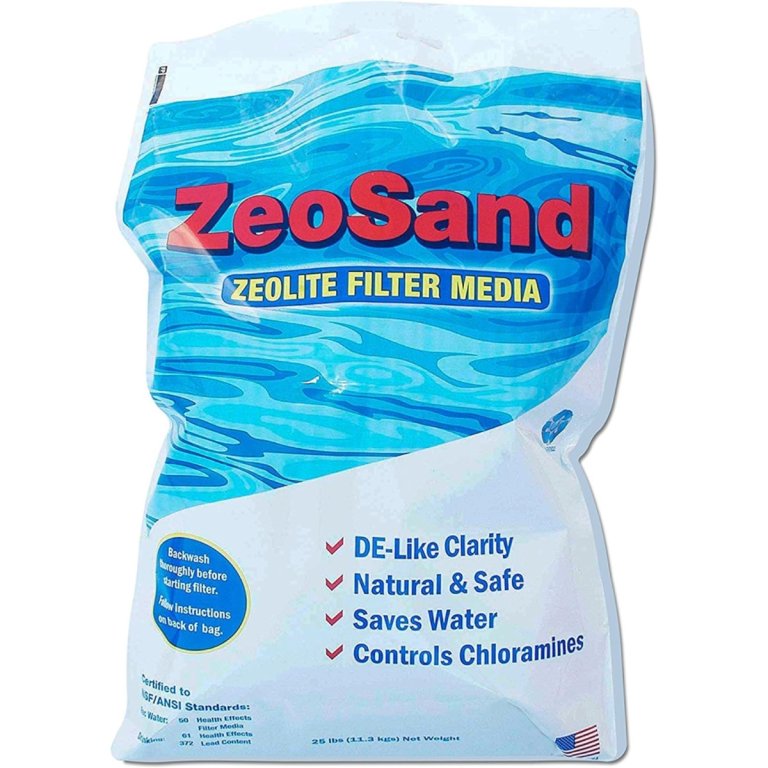
What We Like
- Reduces eye irritation when swimming
- Removes multiple types of filter media
- Lasts for 5 years
What We Don’t Like
- Pricey compared to similar products
- Some users report poor results after use
Product Specs
- Type: Zeolite sand
- Pool water type(s): Unlisted
- Quantity: 50 pounds
When selecting a new pool sand, it may be a good idea to invest in a zeolite sand product, especially if the pool has recurring issues with chlorine levels that result in sore or red eyes. This zeolite sand helps absorb chloramines, which are responsible for causing eye pain and redness while swimming. The sand also has excellent filtration efficiency when catching small dirt, oil, debris, and particles of 3 to 5 microns in size.
This pool filter sand can last for up to 5 years before needing to be replaced, and it comes in a 50-pound bag. However, 50 pounds of Zeo, Inc zeolite sand is the cleaning equivalent of 100 pounds of silica pool filter sand, allowing users to spend less and get the same results.
Get the Zeo Inc pool filter sand at Amazon.
Best Glass Sand
Harsco Metals & Minerals Filter Glass
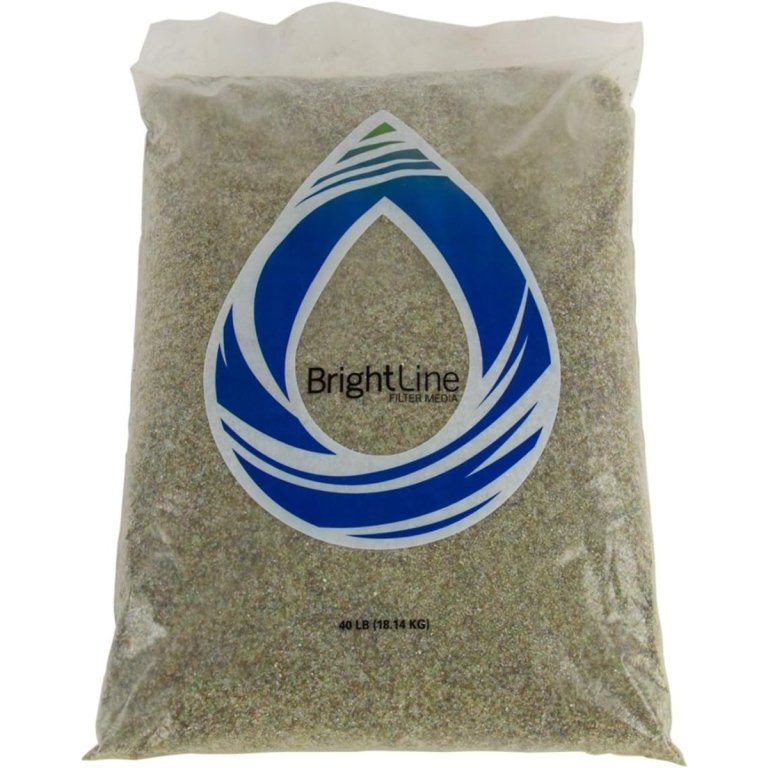
What We Like
- Made with 100 percent recycled materials
- Traps particles as small as 5 microns
- Requires 20 percent less sand materials than other options
- Long-lasting formula
What We Don’t Like
- Some users report poor bag construction
- Pricey compared to similar options currently available
Product Specs
- Type: Glass sand
- Pool water type(s): Unlisted
- Quantity: 40 pounds
This Harsco glass pool filter sand is an excellent option for people who regularly experience high levels of algae in their pool or frequent algae blooms that can turn the pool water green overnight. The glass sand comes in a 40-pound bag and it is designed for filtering hair, dirt, and debris, but where this glass sand really excels is in filtration efficiency as it is capable of trapping tiny particles that can be as small as 5 microns. This option is also made from 100 percent recycled materials, which is a plus for the eco-conscious consumer.
The pool filter sand can also help reduce the need for chemical shock treatments by capturing ammonium ions that can create harmful chloramines. It doesn’t retain as much grime as silica sand, so backwashing is quick and easy. The glass sand outlasts standard silica sand products by two to three times.
Get the Harsco filter glass sand at Amazon.
Jump to Our Top Picks
How We Chose the Best Pool Filter Sands
We researched the most sought-after pool filter sands in their respective categories and discovered that the best options are determined by their type, compatibility with multiple pool types, quantity, and other special features included by top brands.
While searching for and/or testing the best pool filter sands available, we found that the most popular type among users was silica sand for its effectiveness. But, the zeolite and glass sands offered longer working times and the ability to filter media of up to 5 microns in size. Most pool filter sand options included in our top picks are also safe to use in above- and in-ground swimming pool varieties.
For added ease of use, each of these sands comes in 40- to 50-pound quantities per bag for the best bang for your buck. Plus, some of these sands help to reduce eye irritation while swimming and are made with 100 percent natural formulas.
What to Consider When Choosing a Pool Filter Sand
When choosing the best pool filter sand for your sand filter, it’s crucial to determine the type of sand that would be ideal for your pool. Potential buyers will want to consider the grain size, quantity of sand, and whether it’s compatible with above-ground or inground pool filtration systems. Read on for our shopping tips and details about essential product features.
Type
Good pool filter sand can come in three common types that are designed to effectively trap dirt and debris to keep the pool water clean when using various types of filters, including silica, zeolite, and glass sand.
- Silica pool filter sand is the most commonly used type. It’s inexpensive, easy to find, and can filter particles down to 20 microns, which is approximately 0.0008 inches. Silica sand is made with ground quartz, and it has rough edges to help trap particulates.
- Zeolite pool filter sand is made from volcanic rock minerals and can filter debris as small as 10 microns, giving it a slight edge over silica pool filter sand. However, zeolite sand is also capable of binding with chloramines to help maintain the chlorine balance in the pool water.
- Glass pool filter sand is the best option for removing very small particles from the pool water. This alternative to silica sand is made from recycled glass and has excellent filtration efficiency as it can capture debris as small as 3 to 5 microns in size, making it a good option for pools that have recurring algae problems. This is because while algae is often 30 microns in size, algae spores can be much smaller, allowing them to slip through silica sand and create new problems in the pool.
Grain Size
The grain size of pool filter sand can be measured in inches, but due to the size of the sand, it’s easier to express it in millimeters. In order for a sand filter to work properly, it needs grains of sand that are the appropriate size. If the grains are too small then the flow of water through the filter can actually sweep them up and push a large portion of the sand into the pool instead of cleaning the water.
Grains that are too large won’t get pushed out of the filter, but they are also less effective at properly filtering small particles. With this in mind, the ideal grain size for filter pool water is between 0.45 millimeters and 0.55 millimeters or 0.018 inches to 0.022 inches. Never use industrial or play sand in a pool filter. It won’t work well, and it can damage the filtration system.
Above-Ground vs. In-Ground Pool
Clean pool filters can be used with both above-ground and inground pools, but differences in flow rates mean that there are some pool filter sand products that aren’t appropriate for all types.
- Above-ground pool filters will typically be smaller and the flow rate through them will also be lower because the pump doesn’t need to work as hard to pull the water into the filtration system. These sand filters can be used with grains of sand as small as 0.45 millimeters without pulling sand out of the filter.
- Inground pool filters require a heavier grain of sand above 0.5 millimeters so that the more powerful filtration system can be used without worrying about filling the pool with sand.
Beyond the flow rate of the filtration system, there isn’t a lot of difference between pool filter sand used in above-ground sand filters and a sand filter for ingroundpools.
Filter Compatibility
Look for product information that indicates the filter type before deciding on a pool filter sand to refill your sand filter. This can include above-ground, inground, commercial, and residential sand filters with small differences between each type.
- Above-ground and inground pool filters typically use the same type of pool filter sand, but it must be the correct size to prevent the sand from being pulled into the pool instead of acting as a filter.
- Commercial filters will often have to deal with a lot of dirt and debris from a large number of people, so it’s best to use a zeolite or glass pool filter sand that can trap particles as small as 3 to 5 microns.
- Residential pool filters may not require the same level of filtration, so users can get away with the more affordable silica pool filter sand. However, both zeolite and glass can also be used for crystal clear water.
Quantity
The quantity of pool filter sand that is required depends on the specific pool filter. However, there are some basic standards that hold true for most filter brands:
- 16-inch filters require about 100 pounds of pool filter sand.
- 19-inch filters require about 150 pounds of pool filter sand.
- 21-inch filters require about 200 pounds of pool filter sand.
- 23-inch filters require about 250 pounds of pool filter sand.
- 25-inch filters require about 300 pounds of pool filter sand.
Before deciding to pick up 300 pounds of pool filter sand, check the specific filter recommendations to ensure that you don’t overload the filter, which can burn out the filtration system or deposit a large amount of sand into the pool.
The Advantages of Using the Best Pool Filter Sand
There are many advantages to using pool filter sand to help the pool vacuum keep the pool clean including the low maintenance of a sand filter. These pool filters should have the sand changed once every 3 to 5 years depending on the frequency with which the swimming pool is used and any factors that may make the pool dirtier, like close proximity to new construction. Keep in mind that users should backwash the swimming pool filter once per week, but dirtier pools may need to be backwashed two to three times.
The low maintenance required for pool filter sand is also great on the wallet. Sand filters may be expensive initially, but the actual pool filter sand is affordable and easy to find. It helps that the sand only needs to be replaced every 3 to 5 years, so even 250 to 300 pounds of sand isn’t that expensive over a multiyear period.
However, pool filter sand isn’t just the quick, inexpensive option; it’s also an effective method of keeping the pool cleaner and is able to filter debris down to 20 microns in size. Users can also use glass sand in the filter that is capable of filtering particles that are just 5 microns in size, ensuring the water is clean and safe for swimming.
- Pool filter sand requires very little maintenance and only needs to be replaced every 3 to 5 years.
- Maintenance equipment for a pool, like a pool pump or a filter, can become costly, but pool filter sand is easy to find, relatively inexpensive, and it rarely needs to be replaced.
- Pool filter sand is effective at filtering debris from the pool down to an average of 20 microns.
FAQs
Sand filters are a great addition to any household with a pool, but you may still have some concerns about pool maintenance, how pool filter sand works, and if the sand can be reused. Read on to find the answers to some of the most commonly asked questions about the best pool filter sand.
While some prefer to use sand for pool filters to reduce debris, particles, and cloudiness, these systems have some drawbacks. One of the main things that users will want to consider is that sand can tend to clump or provide uneven backwashing if not used correctly.
Backwashing pools with sand filters also takes longer, requires more hands-on pool maintenance than cartridge filters, and reduces the amount of pool water. Finally, some pool filter sands lack the filter efficiency of cartridge filters.
A sand filter for swimming pools can be used to remove most algae from a pool, but any particles that are smaller than 20 microns will pass through the average sand filter. Instead of adding pool algaecides, zeolite or glass filter media are more effective by clearing out materials as small as 5 microns.
The general rule of thumb is to keep a sand pool filter on for 8 hours of the day. However, for peak clarity and effectiveness, users can leave their filter on for 10 to 12 hours.
A swimming pool sand filter should be backwashed about once every week to help remove excess dirt and debris so the filter can function more effectively.
The most common grade of sand is 20-grade silica sand, which can filter particles as small as 20 to 40 microns. For those who prefer stronger filtration, zeolite or glass filters may be the best choice as they can filter particles as small as 5 to 10 microns.
When the pool filter sand becomes too contaminated to properly filter the pool, then it should be replaced, not reused. There isn’t a good method for effectively cleaning pool filter sand, so reusing the sand would give you the same results as just leaving it in the filter indefinitely.
On average, sand should be replaced every 3 to 5 years. This may be longer if the pool stays clear, or shorter if the filter runs all the time. The jagged edges of the sand wear down and become smooth as the sand ages.
A sand filter for pools should last for at least 10 years before it needs a replacement. However, sand pool filters that are properly maintained and cared for by receiving updated valves and gaskets can last for up to 15 years.

